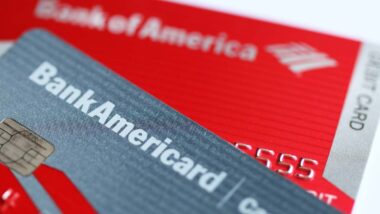Top Class Actions’s website and social media posts use affiliate links. If you make a purchase using such links, we may receive a commission, but it will not result in any additional charges to you. Please review our Affiliate Link Disclosure for more information.
Your credit and debit card numbers are sensitive information and should be kept closely protected to ensure they are not used for fraud or identity theft. Before throwing away your receipts, check to make sure they comply with the law.
While customer receipts do have card numbers printed on them (as both a record of the purchase and a method of enabling returns in the future) the full number cannot be shown on electronically printed receipts under a set of rules called the Fair and Accurate Credit Transactions Act (FACTA).
What are the credit card receipt laws?
A once little-known law regarding credit card numbers and receipts has recently become a serious issue for numerous businesses. Consumers are becoming more aware of their data privacy rights, and numerous credit and debit card lawsuits have been filed across the country based on alleged violations of the Fair and Accurate Transaction Act of 2003 (FACTA).
The Fair and Accurate Credit Transactions Act was signed into law on Dec. 4, 2003, and has been in full force since 2006. According to the Federal Trade Commission (FTC), FACTA is meant to protect consumers against potential fraud and identity theft.
The stated purpose of FACTA is to provide consumers, companies, consumer reporting agencies, and regulators with important new tools to expand access to credit and other financial services and to enhance the accuracy of the consumers’ financial information while also helping to fight identity theft.
The main provisions of FACTA compliance center on combating credit card fraud and protecting consumer privacy by prohibiting certain information from being printed on customer transaction receipts, specifically pertaining to debit and credit card numbers.
Is it legal to have a full credit card number on a receipt?
The short answer is no! It is not legal for a merchant to print the full credit card number on a receipt for a customer.
One of the main facets of the FACTA act requires that merchants leave off all but the last five digits of card numbers of debit and credit card receipts.
Under FACTA, the card numbers on a credit card receipt are protected using a process called truncation — that is, the shortening of the credit card number, often using asterisks, until only the last five digits or fewer remain visible.
Properly truncated, credit card numbers on receipts should look something like this:
**** **** ***1 2345
In many cases, businesses may choose to truncate all but the last four digits of the card number, like this:
**** **** **** 4321
A credit card number cannot be truncated to show any digits from elsewhere in the card number than the last five spaces. Therefore, this is not allowed:
1234 5*** **** ****
On top of the credit card number truncation rules, FACTA also prohibits any part of a card’s expiration date and CVV (the security code on the back) from being printed.
The expiration date of the customer’s debit or credit card receipt must be removed in its entirety.
However, it is important to note these rules do not apply for the merchant copy of a credit card or debit card receipt. According to a definition from smartcapitalmind.com, “A credit card receipt is an acknowledgment given by a vendor, merchant, or bank to credit card holders in exchange for a payment or a purchase made with a credit card.”
One copy of this receipt is given to the cardholder, which must be properly truncated according to FACTA rules. The other copy, however, is kept by the merchant, which often includes the full card number so that, if the charge is disputed, the merchant has a record of the card used to pay, according to this credit card receipt definition.
The statute states that “no person that accepts credit cards or debit cards for the transaction of business shall print more than the last 5 digits of the card number or the expiration date upon any receipt provided to the cardholder at the point of sale or transaction.”
Moreover, these rules only apply to electronically printed receipts — not to receipts that are handwritten, physically imprinted from the card, or to electronic receipts sent via email or text message.
While Congress passed FACTA in December 2003, it has been phased in gradually with the effective date for FACTA compliance being December 4, 2006.
FACTA is a federal law that applies to all states, but individual states have enacted their own additional credit card receipt laws as well.
 Are there any exceptions?
Are there any exceptions?
There are a few notable exceptions to these FACTA truncation credit card receipt requirements. In cases where the receipts are handwritten or manually imprinted, card numbers do not need to be truncated. This is relatively uncommon, as the vast majority of transactions are done using electronically printed receipts.
Does this still happen?
It may seem difficult to believe in this age of digitized equipment and high-tech transactions, but retailers are still being sued over failure to properly truncate consumers’ credit and debit card numbers in accordance with the FACTA law. Indeed, it seems that not all merchants are in compliance with FACTA credit card receipt laws and could be subjected to hefty fines.
Godiva Chocolatier recently settled a FACTA class action lawsuit for $6.3 million. Slot machine producer Everi Holdings agreed to pay $14 million in a similar settlement. Both companies had faced claims that they printed too much information on debit or credit card receipts.
What are the risks of FACTA non-compliance?
If your credit card receipt has too much identifying information on it, such as your full credit card number on a receipt (or even just more than the last five digits) or the expiration date, you may be faced with serious issues like fraud and identity theft. Indeed, access to too much of your information via your credit card receipt can allow a thief or fraudster to piece together enough information to access your card or accounts.
The risks of failing to comply with FACTA credit card receipt requirements for businesses are also clear: it can lead to high fines or even litigation.
What are the penalties?
In light of the amount of time given for compliance and the ongoing decline in the cost of technology, it seems there is little excuse for not following the law and severe penalties for violations reflect this. Under FACTA statutes, violators can be liable for up to $1000 per violation.
Since a FACTA violation occurs each time a non-compliant receipt is issued — and many retailers issue dozens, if not hundreds, of debit and credit card receipts per day — potential liability can reach many millions of dollars for retailers found to have “willfully” violated FACTA rules.
If a retailer is found to be in “willful” violation of FACTA rules, they can be held liable for up to $1,000 per violation, plus attorney fees and costs.
Most legal action taken against retailers who fail to follow the law are class actions with dozens or even hundreds of plaintiffs — meaning that even a handful of violations can get enormously expensive.
How can reporting FACTA violations help?
Reporting violations of FACTA that you find on your receipts can help protect not just you and your own information from potential fraud or identity theft, but the information of hundreds or even thousands of other customers, according to Investopedia. This is because the machines that print these receipts are programmed to comply with FACTA credit card receipt laws.
If a machine has not been updated to comply with FACTA rules (properly truncating the credit card numbers and completely censoring the expiration date) then the error is not just on one receipt, but is instead being repeated on every receipt it prints.
Therefore, being able to quickly spot problems with FACTA compliance on receipts can help protect you and countless other customers who have been affected by the same violation.
Can I file a FACTA lawsuit?
Check for credit card numbers on receipts to see whether it follows FACTA regulations for card number truncation and expiration date censoring. If it does not, such as if it shows the full credit card number on the receipt, you may be able to report the violation and be eligible for a financial award.
As noted earlier, FACTA statutory damage awards can reach $1,000 per violation. Be sure to keep any relevant credit card receipts as evidence.
If you were given an electronically printed credit or debit card receipt at the point of sale or transaction on which the expiration date or debit or credit card numbers were displayed improperly, you may be eligible to file a FACTA lawsuit.
Filing a lawsuit can be a daunting prospect, especially against a major retailer, so Top Class Actions has laid the groundwork for you by connecting you with an experienced attorney. Consulting an attorney can help you determine if you have a claim, navigate the complexities of litigation, and maximize your potential compensation.
Join a free credit card receipt class action lawsuit investigation
If you have a receipt, invoice or contract from a retailer or vendor that includes more than the last five digits of your credit card or debit card number or any portion of the expiration date, you may qualify to file a credit card receipt class action lawsuit.
This article is not legal advice. It is presented
for informational purposes only.
ATTORNEY ADVERTISING
Top Class Actions is a Proud Member of the American Bar Association
LEGAL INFORMATION IS NOT LEGAL ADVICE
Top Class Actions Legal Statement
©2008 – 2024 Top Class Actions® LLC
Various Trademarks held by their respective owners
This website is not intended for viewing or usage by European Union citizens.


 Are there any exceptions?
Are there any exceptions?













8 thoughts onShould my credit card receipt show my full card number?
PLEASE ADD ME !!!!!!!!
Add me please
Please add me
Add me
add me please
Please add me
Add me
ADD ME